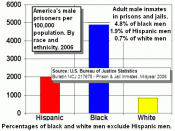Forms of Imprisonment
When we speak of a prison and incarceration, the first thought that comes to mind is inmates held in a prison system with the effort to protect society from guilty criminals. The word prison can mean: 1. A place for the confinement of persons in lawful detention, especially those convicted of crimes. 2. A place or condition of confinement or forcible restraint. 3. A state of imprisonment or captivity (Easton 175). If we take a closer look at the denotation of the third definition, we notice that it alters slightly from those of the first two denoted. Instead of the word "place," we see that the third denotation refers to a "state." State can be defined as: 1. A mental or emotional condition. 2. A condition of excitement or distress (American Heritage Fourth Edition). We can plainly see that imprisonment can generally occur both in the physical and mental states of being.
Zimbardo's "mock prison" held individuals in physical contempt. During physical incarceration an individual is withheld from society both physically and socially. A correctional facility is no doubt a tangible and dimensional structure that the inmate is lodged in against his will. During a mental state of incarceration an individual does not have any way to be removed from such a structure. One may consider how incarcerated indivduals end up in prison. Perhaps wrong judgement upon their actions caused them to be in such a place where they are stripped from their liberty and freedom. Possibly a mental illness or "mental incarceration" may have made the individual unable to properly distinguish between right and wrong judgement. Consider the fact of incarcerating an individual who is trapped in a state of mental illness and unable to understand what crime they have committed. To be guilty of a...



I see where your coming from
Instead of just comparing the definitions, a thought on where to go with the system or "new" ideas might bring into light what your feeling are trying to convey.
8 out of 8 people found this comment useful.